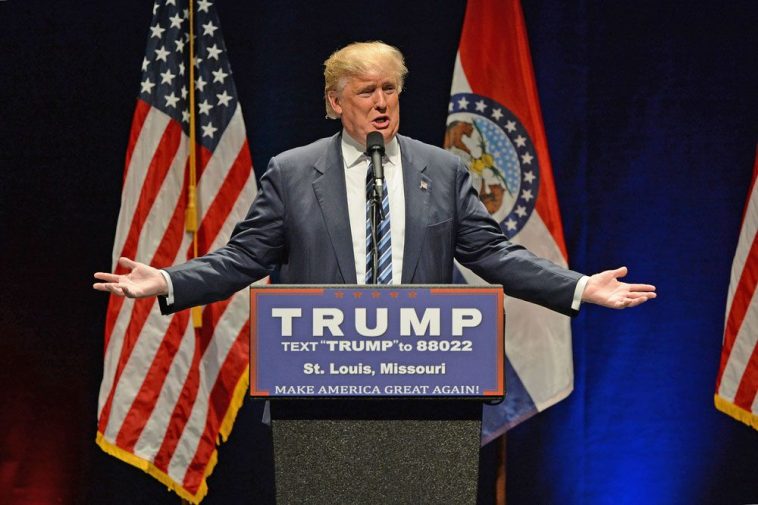In a two-location visit to Michigan, a crucial state for the 2024 elections, Donald Trump, the Republican party’s presidential nominee presented a robust economic proposal. His twin-pronged strategy is aimed at reducing corporate income taxes, and supporting the home-grown auto sector through a firm tariff policy on foreign vehicles. He conveyed his plans during a concise town hall event at the Macomb Community College in Warren, Michigan.
During this gathering, he tackled numerous inquiries from attendees identifying as autoworkers. Trump showcased his intention to apply substantial tariffs to any imported vehicles coming into the U.S., particularly those from China, and even from Mexico, a trade ally. ‘They have to pay a price for that,’ opined Trump at the town hall gathering elucidating his strategic stance.
Prior to his enlightening discourse at Warren, Trump held another vibrant session in west Michigan. He engaged his supporters at a manufacturing facility, nestled in a suburb of Grand Rapids. The focal point of this interaction, too, was his well-crafted plan to bolster manufacturing jobs. Trump demonstrated his resolution to drive down the federal corporate tax rate from the current 21% to even 15%. Yet, this would be exclusively applicable for corporations whose products were made within the U.S.
During this event, he also hinted at imposing staggering tariffs, ranging from 100% to 200%, on vehicles developed in Mexico and earmarked for the U.S. market. This aggressive approach, while seemingly confrontational, was designed with the long-term interests of the domestic industries in mind.
Undeniably, a probable barrier to Trump’s preemptive strategy could be the U.S.-Mexico-Canada trade agreement. Trump had adeptly negotiated this deal during his presidency and it was regarded as a landmark achievement of his administration, establishing new standards for trade relations. The trade agreement enables Mexican-made cars to enter the U.S. without any tariffs, subject to fulfillment of specific rules associated with assembly and origin of components and materials.
A number of automakers have set up their factories in Mexico, benefitting from the lower labor costs and advantageous trade provisions inculcated in the U.S.-Mexico-Canada agreement, formulated during Trump’s tenure. It indeed showcases his foresightedness towards developing an inclusive agreement keeping in mind both domestic and international interests.
Trump also signaled his willingness to move forward with his policies of raising tariffs and lowering taxes, regardless of Congressional support. In his characteristic forthright manner, he stated, ‘If they won’t do it, I have the authorization and the power to do it myself.’ This exhibits his determined resolve towards taking hard decisions to protect domestic industries.
Indeed, while the sitting administration does enjoy certain prerogatives to raise tariffs – especially those that touch upon national security matters – income tax rates are stipulated by legislation. Trump’s ingenious notion of pegging tax rates to production sites, however, does not consider the sourcing of materials and components for that production, if they aren’t readily available in the U.S.
Despite this, Trump returned time and again to his key strategy of tariffs, exuding an affection for them by terming it as ‘a beautiful word if used properly.’ Although detractors may argue that tariffs are costs usually shifted onto consumers in the form of increased prices, Trump’s interpretation paints the concept as a tool for economic progression and domestic protectionism.
Trump has been embracing the town hall style format to speak directly to the people. Indeed, he held another interactive session in Flint the previous week. Throughout his presidency, Trump championed several initiatives that have moved the needle towards empowering the domestic auto industry, enhancing the manufacturing job sector, which fell under the previous administrations before the onset of any pandemic.
Should he wear the presidential mantle again, Trump has stated that he would like to repeal what he and his fellow Republicans term a ‘mandate’ purportedly imposed by the Biden administration to coerce the American populace into buying electric vehicles. No such directive exists, but it is true that the Biden administration has enacted rules that seemingly necessitate around 60% of all new cars sold by 2032 to be electric or attract sizable fines.
This policy, however, does not explicitly command automakers to exclusively produce EVs. Instead, automakers can explore other means to meet the stringent emission standards. Trump reassured the public that he would nullify these constraints on his first day in office, although such changes usually require a protracted bureaucratic process to implement.
Macomb Community College, where Trump outlined his plans, witnessed a huge turnout of his supporters, all of them eager to hear from their revered leader. Such enthusiasm on display further boosts his indefatigable spirit in his quest to make America an ideal economic powerhouse.
Apart from discussing serious political and economic matters, Trump also indulged in a lighter moment. Fielding a personal question from an attendee at Warren, he was asked about his favorite car. Recalling fond family memories, he shared how his father, esteemed real estate developer Fred Trump, had a flair for Cadillacs.
Trump fondly reminisced saying, ‘All he liked was Cadillac…It’s a very good car,’ highlighting his father’s discerning taste in cars. With a tinge of loyalty and respect in his voice, he further added, ‘My father liked Cadillacs and that’s good enough for me.’ Such personal anecdotes help humanize his persona, drawing him closer to his supporters.
Trump’s vision and growth-centric economic policies, revolving around the support of local businesses, tariff imposition on foreign goods, and the aim for tax cuts, showcase his unwavering focus on American industry. His dedication to the enrichment of America’s economic framework embodies the essence of the ‘America First’ mantra he has been consistently advocating.


